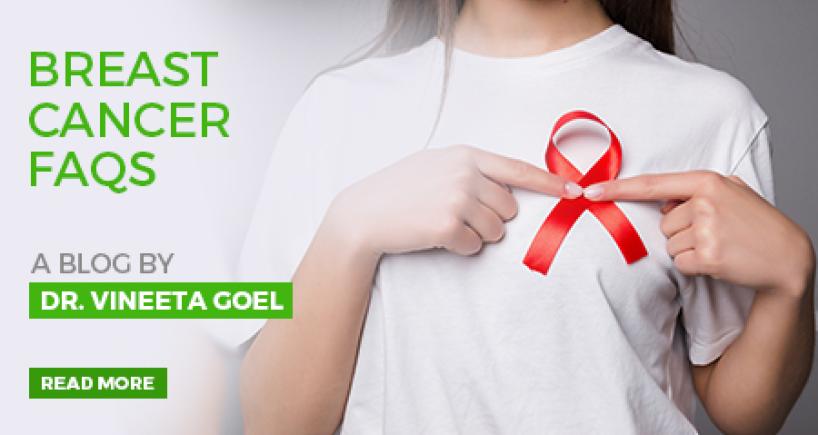
Oncology
Breast Cancer Faqs
Breast Cancer Faqs Sep 30, 2021
 BREAST CANCER FAQs
BREAST CANCER FAQs
- What is Breast Cancer?
- Cancer arising in breast tissues is called breast cancer. Although, extremely uncommon in men, breast cancer can occur in both women and men.
- All breast lumps/swellings are cancer?
- Majority breast lumps are non- cancerous or benign. However, one need to consult a doctor and get herself checked for confirmation if any palpable breast lump/swelling is there.
- Is pain in breast, a symptom of cancer?
- Cyclical breast pain before or after every menstrual cycle is not related to breast cancer.
- Majority breast cancers are painless. However sometimes in advanced stages breast cancer may be associated with pain.
- Who is at risk of breast cancer?
- Being woman, itself is a risk for breast cancer which means every woman has some risk for getting breast cancer and this risk increases with increasing age.
- Risk of breast cancer is higher in women with family history of either breast or ovarian cancer or women with certain genetic abnormalities such as BRCA gene mutations.
- Additionally, women who start early in age with their menstrual cycles or have late menopause (after age of 50 years) are at a higher risk.
- Women who have first pregnancy after the age of 30 years or later or have no biological children are also at higher risk.
- Women who are overweight and inactive also carry higher risk of breast cancer.
- Does breast cancer always run-in family? If I have cancer- will my daughter also get it?
- Not always, majority Breast cancers (>95%) are not hereditary and do not run-in family.
- What are the symptoms of breast cancer?
- Lump/mass/swelling in breast and /or arm pit
- Change in size or shape of breast
- Change in position of nipple, bloody nipple discharge, nipple retraction (Nipple turns inwards)
- Change in skin colour or texture: dimpling, puckering or redness
- How can I lower my risk of breast cancer?
- Breast cancer risk can be lowered by adopting a healthy lifestyle practices like
- Be physically active and daily exercise
- Balanced diet
- Maintain healthy weight
- Early pregnancy and breast feeding
- Avoiding smoking and alcohol
- Monthly breast self –examination after age of 25 years
- Clinical Breast Examination by doctor from age of 25-40 years- Once a year
- Screening mammogram – once a year after age of 40 years
- If you have a family history of breast cancer, discuss genetic testing with a genetic counselor.
- How can I get breast cancer screening done?
- Breast cancer screening has several components.
- After the age of 25 Years, start with monthly self -breast examination.
- Clinical Breast Examination by doctor from age of 25-40 years- Once a year
- Mammogram (X Ray of Breasts) once a year after the age of 40 years.
- What is Mammogram/mammography?
- Mammography is a special type of low dose x-ray of breasts.
- What is the ideal time to do breast self- examination?
- Best time for breast self -examination is 2-3 days after cessation of menstruation.
- For women who have attained menopause, they can fix a particular date very month for self - examination.
- Does wearing padded or wired bra or use of antiperspirants increase risk of breast cancer?
- No, there are no clinical studies suggesting that wearing padded/wired bra or use of antiperspirants increase risk of breast cancer.
- Does Breast cancer spread by doing biopsy/needle test?
- No way- No cancer including breast cancer does not spread by any needle test or biopsy. Biopsy is an essential diagnostic test for confirmation of diagnosis.
- For patients with Breast cancer- is removal of whole breast (mastectomy) is safest and only treatment option?
- All pts with breast cancer do not necessary need complete surgical removal of breasts/mastectomy. Removal of only tumour/cancer and preservation of breast – called as breast conservation surgery is as safe as mastectomy for majority breast cancer patients.
- Do all patients with Breast cancer need chemotherapy?
- Small percentage of early and favorable breast cancer patients may not require chemotherapy. In the present times, all cancer patients are discussed in tumour board to discuss optimum treatment strategies.



















